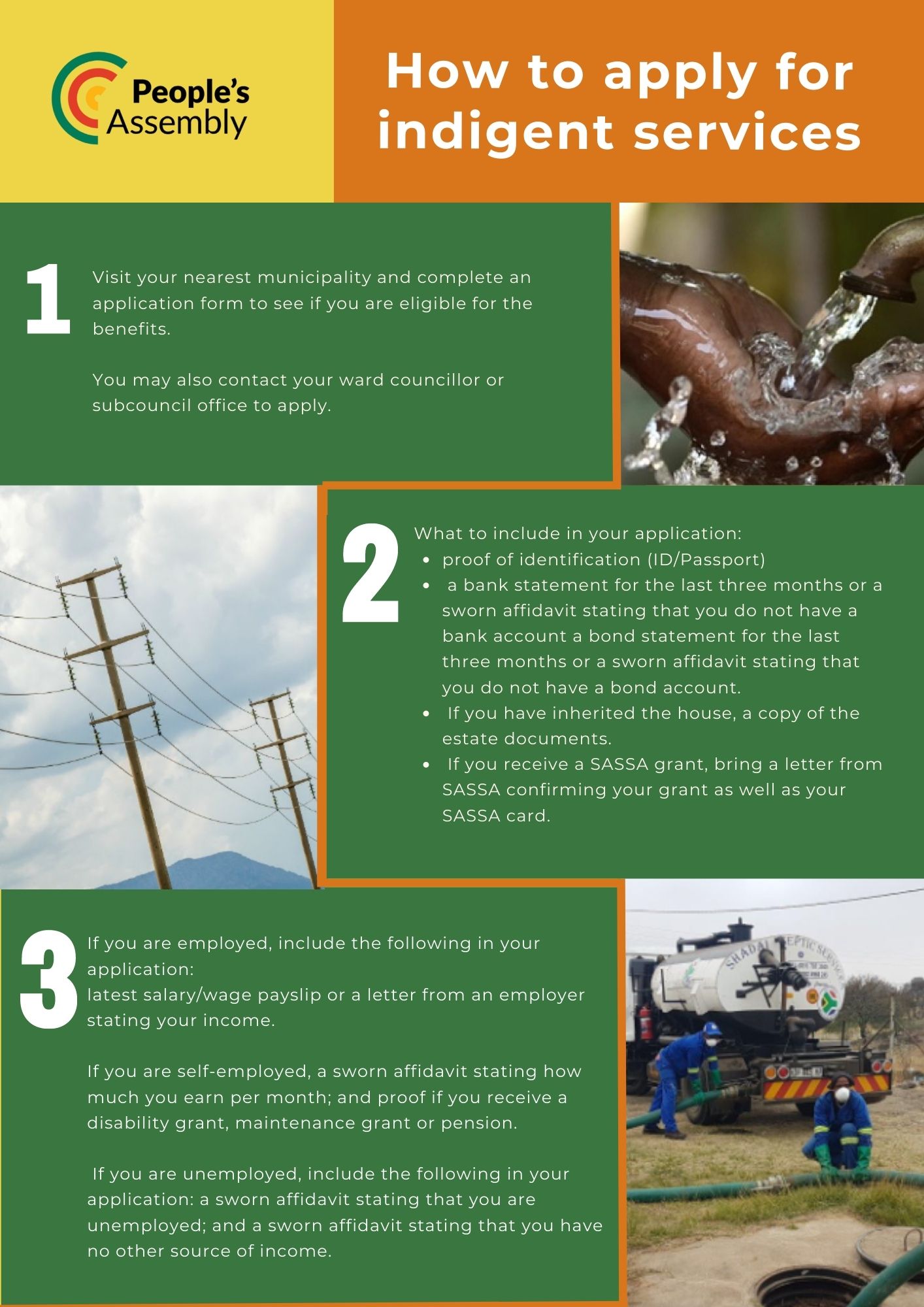In 2001, South Africa adopted an indigent policy intended to provide free basic services to poor households. Under this policy, municipalities are required to identify indigent households that would receive services such as water, electricity, sanitation, and refuse. Households are required to register with municipalities to qualify for free basic services.
Municipalities play a critical part in informing the public and assisting with the identification and registration of qualifying households. They also have an obligation to vet every application, selecting only those households that meet various criteria. Municipalities determine their own criteria for identifying and registering indigents. To a large extent, this determination is based on the resources available to the municipality.
In 2017 most municipalities (147 out of 257) classified an indigent household as a family earning a combined income of less than R3 200 per month. Eleven municipalities (nine local municipalities and two district municipalities) adopted a lower income poverty threshold of R1 600 per household per month.
Municipalities can also decide on the extent to which they subsidise an indigent household. The general rule is that indigent households are entitled to 6 kl of free water per household per month and 50 kWh of free electricity per household per month. The extent to which sanitation and refuse removal services are subsidised varies from municipality to municipality.
Indigent status isn’t for life, however. The economic status of a family might improve over time. To ensure that only the poorest families are catered for, municipalities require registered households to reapply for indigent status on a regular basis, often once a year. Municipalities may conduct audits to verify the authenticity of the information furnished or possible changes in the status of applicants.
The Department of Cooperative Governance and Traditional Affairs (CoGTA) is in the process of signing a Memorandum of Understanding with the South African Revenue Services (SARS): once municipalities have compiled their indigent registers, they would send them to CoGTA and CoGTA then passes the information to SARS to check whether some of those people should be regarded as indigent.
Despite the major need for social assistance and the funding constraints, the indigent grant is underspent significantly as many municipalities are not compiling their registers properly so that those who are entitled to assistance, actually get the assistance.
A significant number of poor households remain unregistered, leading to low uptake of the Free Basic Service (FBS) programme. There are several reasons contributing to this issue:
-
Limited Awareness: Many indigent households are unaware of the program due to inadequate awareness-raising campaigns and communication strategies by municipalities. To bridge this gap, it is crucial to educate residents about the benefits and eligibility criteria of the Indigent Programme. You can use the ‘Write To’ feature on our website to access your local ward councillor for more information on how to register.
-
Informal Settlements and Backroom Dwellings: Informal settlements and backroom dwellings pose challenges in accurately identifying and targeting indigent households. It is essential to develop effective strategies to address these issues and ensure that the program reaches all those in need.
-
Lack of Verification Tools: Municipalities face difficulties in verifying the authenticity of their indigent registers. The absence of reliable verification tools hampers the accurate assessment of eligibility, leading to the potential inclusion of ineligible households or the exclusion of deserving ones.
-
Incomplete Policies: Some municipalities lack costed and adopted indigent policies, which are crucial for the effective implementation of the programme. It is necessary for municipalities to develop comprehensive policies aligned with the National Indigent Policy Framework and the Implementation Guidelines.
To address the low uptake of the Free Basic Service program and enhance the Indigent Programme overall, the government and relevant stakeholders can take the following steps:
-
Updating Indigent Registers: Ongoing support should be provided to municipalities to update their indigent registers regularly. By actively reaching out to potential beneficiaries and encouraging registration, municipalities can ensure that the program reaches those who genuinely require assistance.
-
Policy Development and Adoption: The Department of Cooperative Governance and Traditional Affairs (COGTA) should continue supporting municipalities in developing and adopting comprehensive indigent policies. This includes costings and tabling policies in municipal councils, ensuring transparency and accountability.
-
Information Sharing and Best Practices: Regular forums should be established, where provincial COGTAs and municipalities can share best practices, discuss challenges, and strategize effective mechanisms to support the roll-out of the FBS program. Collaboration and knowledge exchange can help overcome common barriers and ensure consistent progress.
-
Adequate Funding Allocation: It is crucial to allocate sufficient funding to the Indigent Programme. By utilising available funds effectively, more indigent households can benefit from essential services, such as electricity, water, sanitation, and refuse removal. Additionally, reallocating unspent funds from previous years can be explored to maximize impact.
The Indigent Policy serves as a crucial tool for addressing inequality and providing a safety net for the poor and vulnerable in South Africa. However, the programme's effectiveness is hindered by low registration rates and other challenges. By prioritising awareness campaigns, policy development, information sharing, and adequate funding, the government, civil society, and community organisations can work together to ensure that the Indigent Programme reaches those in need.
Sources:
https://www.statssa.gov.za/?p=11722 https://www.westerncape.gov.za/text/2012/11/national_framework_for_municipal_indigent_policies.pdf


Comments
Keep comments free of racism, sexism, homophobia and abusive language. People's Assembly reserves the right to delete and edit comments
(For newest comments first please choose 'Newest' from the 'Sort by' dropdown below.)